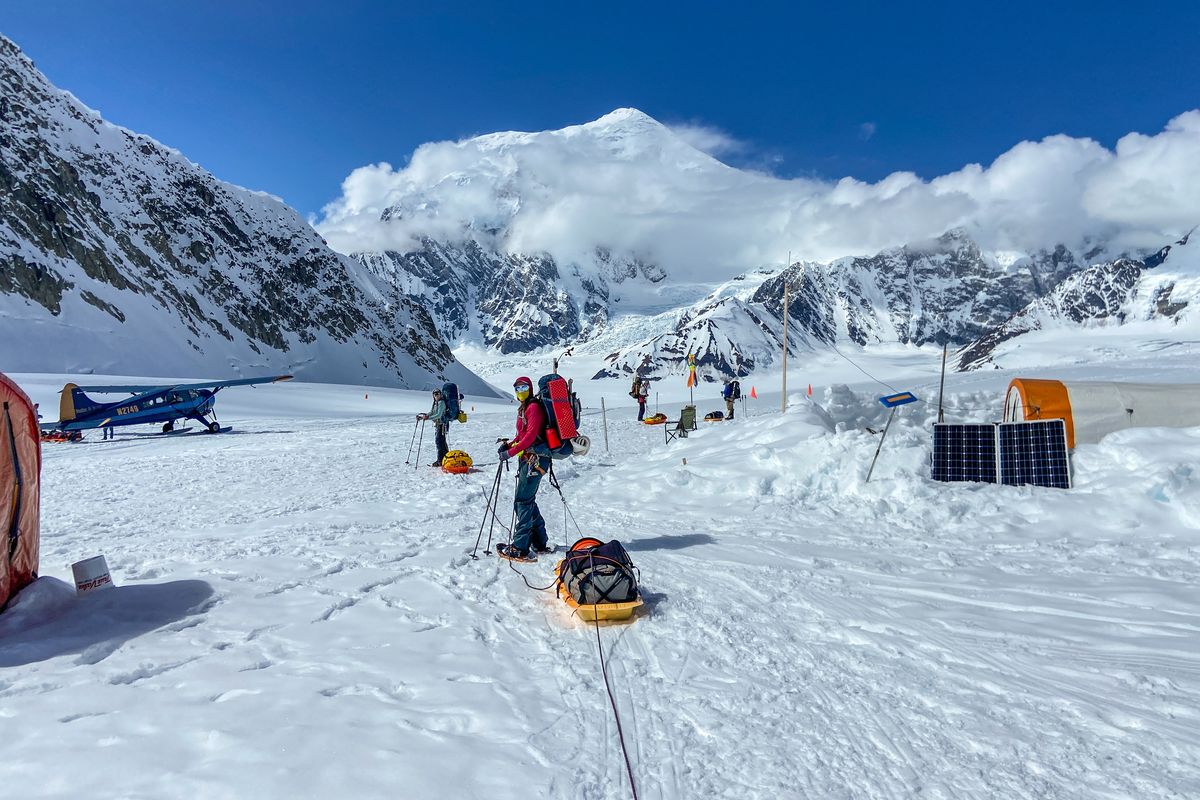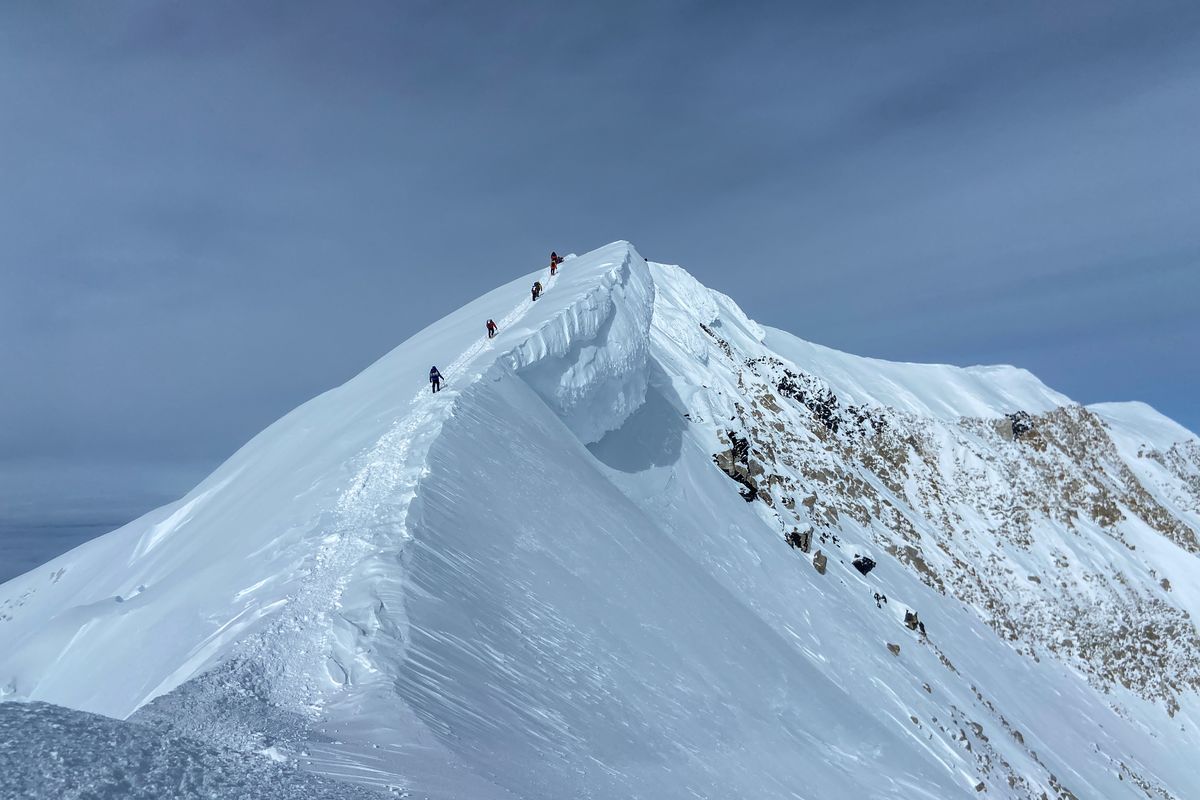Spokane couple summits Denali, capping yearslong effort to bag all 50 high points in the U.S.

Shortly after Trisha and Marlin Thorman returned from a 20-day expedition to North America’s highest peak, they started reroofing their home.
While the heat in Spokane was intense, especially on a roof, it was not altogether unwelcome.
“Oh, it’s good to be warm,” Trisha Thorman said in an interview June 14, reflecting on her time on the 20,310-foot Denali.
On May 31, the Spokane couple summited Denali a day after their 11th wedding anniversary, capping off a yearslong effort to climb the highest peak in every U.S. state.
For Marlin, it was his second time summiting Denali. For Trisha, it represented an evolution in her relationship and commitment to climbing.
During fall 2018, the Thormans gave a talk to the Spokane Mountaineers about their effort to climb the highest point in every state. At the time, Marlin had completed the goal while Trisha had bagged 49 of the 50.
But the 50th, Denali, was by far the hardest and most committing of the endeavors. At the time, she said she had no desire to bag that peak.
But after giving that talk, a friend, Joanna Balin, said, “Why not?”
And an idea was born. Yeah, why not?

At the same time, Trisha’s relationship to climbing was evolving. Previously, she’d approached each climb as a trophy, something to be attained once and never done again. She had a firm policy of not returning to mountains she’d already bagged.
But that began to shift, and she found herself repeating climbs.
“I was doing more on my own and without Marlin,” she said. “And doing it more for me.”
Marlin is an experienced alpinist with first ascents in the Cabinet Mountains of Montana and several impressive and difficult climbs under his belt in Canada, Alaska and the Lower 48.
When Trisha and Balin considered climbing Denali, they asked Marlin if he’d be interested in climbing with them and providing invaluable experience and logistical support.
“My legs carried me up there,” Trisha said. “But logistically, I could not have done it without Marlin. I call him my personal guide.”
The Thormans started assembling a team, initially hoping to climb the mountain last year but eventually abandoning those plans because they couldn’t find enough team members.
Instead, they set their sights on this year, eventually recruiting Mandy Demetriou.
The quad, dubbed 3-1 Advantage (a joke referencing both a pulley system that uses mechanical advantage and the fact that Marlin was the only dude on the team) started training, climbing Rainier and other peaks in the Cascades to dial in their glacial travel and teamwork.
“I was excited that she wanted to do it,” Marlin said. “I remember back in 2015, when we talked about it, ‘Should I go or should I not?’ I told her, ‘Well, don’t just do it as a checklist. If you’re going to do it just to check it off, you’re going to hate it.’ ”
While climbing Denali is certainly a physical feat requiring good fitness, it’s just as much a logistical undertaking requiring the proper gear, packing and timing.
“This was my fifth Alaska expedition,” Marlin said. “Third time on Denali. I felt like I had a much better handle on what to expect.”
The team ramped up its training in January, doing hill workouts, dragging sleds and carrying weighted backpacks.
“I felt like I was well-prepared,” Trisha said.
But then, just weeks before the planned departure, Balin fell rock climbing and injured her ankle. Denali? No way, said her doctor.
They tried to change the trip date to give Balin more time to recover, but couldn’t, Trisha said.
The four-person team dropped to three.
Marlin left Spokane before Trisha and Demetriou and spent two weeks climbing in the Ruth Gorge. The highlight of that trip was summiting Mt. Bradley via a 4,500-foot linkup of two routes.
After successfully completing that climb in a 27-hour push, Thorman flew back to Anchorage and met up with Trisha and Demetriou to finish packing.
On May 14, they flew to the Kahiltna Glacier Base Camp and started the climb.
A note: When climbing Denali, and most big mountains, parties break the climb into sections. They ascend, set up camp, acclimatize or wait for good weather, before moving to the next camp. These camps are often named according to what elevation they are.
Often, in an attempt to ease the load, climbers will shuttle gear to the next camp, cache it and then return to their lower camp for the night before moving camp.
The team headed from the landing zone at 7,200 feet to their first camp at 7,800 feet. The three climbers were pulling 410 pounds worth of gear. On average, each climber’s sled weighed 100 pounds in addition to a 40 pound backpack.
“It’s your best friend and your worst enemy,” Trisha said of the sleds.”It’s like a big monster, but you need it.”
Over the next few days, they leapfrogged their way up the mountain.
But Demetriou was not feeling well. Almost from the first day, she was having trouble breathing, possibly a residual effect of contracting COVID-19 in January. By the time the team had reached 11,000 camp, Demetriou felt only worse, despite several rest and acclimatization days.
“If you’re feeling bad right now, it just gets harder and colder and higher in elevation,” Marlin said.
Eventually, Demetriou made the painful decision to leave. On the seventh day of the trip, Marlin and Demetriou headed down back to the airstrip. Marlin dropped her off and returned to 11,000 camp, a 20-mile day with 5,000 feet of elevation gain.
Now the team had dropped to two.
The weather on Denali was particularly tricky, Thorman said, forcing the couple to move camp on bad weather days. The weather was significantly worse than on his 2015 trip.
For example, guides leading clients up Denali normally don’t build snow walls around their clients’ tents because the clients don’t know how to, adding a lot of work for the guides, Marlin said.
This season, all the guided groups had snow fortresses guarding their tents from the wind.
“Every camp had walls around it, which is a testament to how crappy the weather was,” he said.
The bad weather meant that, of the 20 days the two spent on Denali, they were only moving for 10.
The duo continued and after 17 days reached 17,000 camp on May 30; their 11th wedding anniversary. By now the altitude was bothering Trisha more and she was sleeping poorly.
But the weather on the 18th day, May 31, was good and they decided to push to the summit. Unfortunately, everyone else on the mountain was aiming for the same window.
On May 31, they left camp at 10 a.m. and started up, alongside the 50 or 60 other climbers making a bid that day.
By 19,500 feet, Trisha was having a breakdown and was near quitting, unsure if she could “muster up more energy for the last push.”
But “after a break with lots of deep breathing, hot soup, water, and self- and husband pep talk” the duo pushed on.
“I’m just going to go one step in front of the other,” Trisha remembers thinking. The hours of training she’d put in helped. She reminded herself that the remaining distance to the top was just “one hill repeat. Like back in Spokane.”
The sled provided its own sort of sick motivation.
“I don’t want to drag a sled up this mountain again,” she said. “I’m going to get to this summit.”
And they did, summiting at 7:45 p.m.
The weather was good, although cloud cover down low prevented them from seeing the valleys. After 30 minutes taking photos and enjoying the accomplishment, they headed down, arriving at 17,000 camp around midnight.
There they ate, packed and started the descent to 14,000 camp at 1:30 a.m. as a storm rolled in. They arrived there at 4:30 a.m., slept for a few hours, packed and headed to 7,800 camp. Because of bad weather, they slept there before descending to the airstrip.
On June 2, they flew off the mountain and back to Anchorage.
Arriving back in civilization was a shock with all the comforts of modern life cast in vivid detail.
“I think the biggest thing is … you lose all your creature comforts,” Marlin said.
“You have no air conditioning, you have no heat. You have no running water. You have no toilet.”
That contrast, at least partially, is part of the appeal of climbing for the Thormans. The lack of comfort, highlighting all the comforts we take for granted in the modern world.
Including warmth. Even the warmth of a hot roof on a June day in Spokane.
Correction: Joanna Balin suggested Trisha Thorman try and climb Denali.